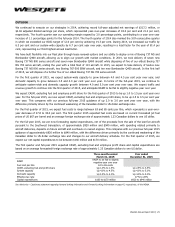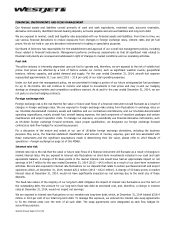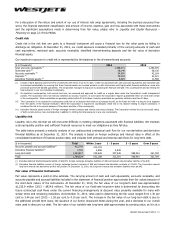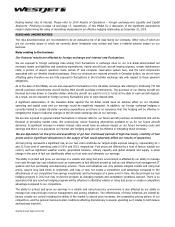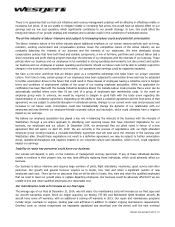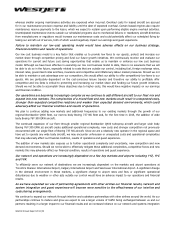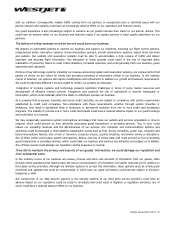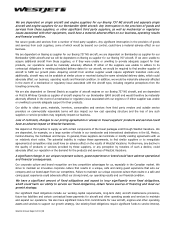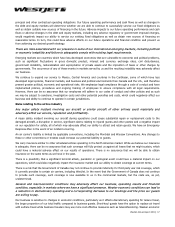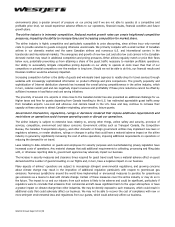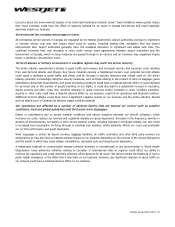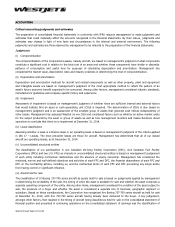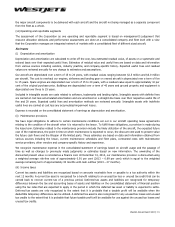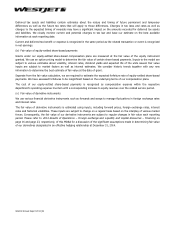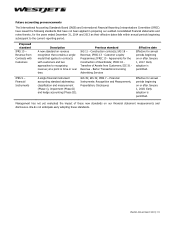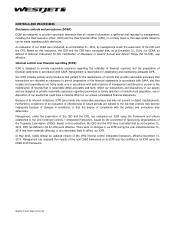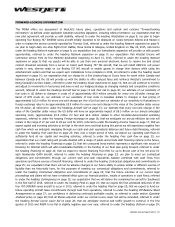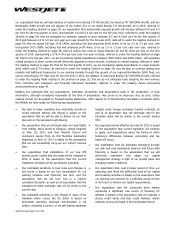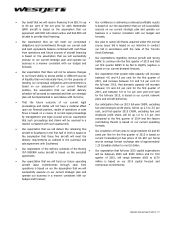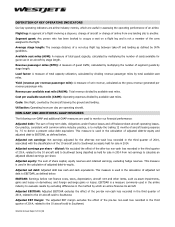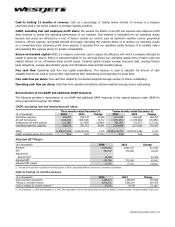Westjet 2014 Annual Report Download - page 41
Download and view the complete annual report
Please find page 41 of the 2014 Westjet annual report below. You can navigate through the pages in the report by either clicking on the pages listed below, or by using the keyword search tool below to find specific information within the annual report.
WestJet Annual Report 2014│ 39
Concerns about the environmental impacts of air travel and tendencies towards “green” travel initiatives where guests reduce
their travel activities, could have the effect of reducing demand for air travel in Canada and abroad and could materially
adversely impact our business.
Governmental fee increases discourage air travel.
All commercial service airports in Canada are regulated by the federal government. Airport authorities continue to implement
or increase various user fees that impact travel costs for guests, including landing fees, navigation fees and airport
improvement fees. Airport authorities generally have the unilateral discretion to implement and adjust such fees. The
combined increased fees, and increases in rents under various lease agreements between airport authorities and the
Government of Canada, which in many instances are passed through to air carriers and air travelers, may negatively impact
travel, in particular, discretionary travel.
Terrorist attacks or military involvement in unstable regions may harm the airline industry.
The airline industry experienced a decline in guest traffic and revenue and increased security and insurance costs resulting
from past terrorist attacks and threats. Any future incidents causing a heightened concern over potential terrorist attacks
could cause a decrease in guest traffic and yields, and an increase in security measures and related costs for the airline
industry generally. Increasingly restrictive security measures, such as those relating to the content of carry-on baggage, guest
identification document requirements, and guest screening procedures could have a material adverse effect on guest demand
for air travel and on the number of guests traveling on our flights. It could also lead to a substantial increase in insurance,
airport security and other costs. Any resulting reduction in guest revenues and/or increases in costs, including insurance,
security or other costs could have a material adverse effect on our business, results from operations and financial condition.
Additional terrorist attacks would likely have a significant negative impact on our business and the airline industry. Should
such an attack occur in Canada, the adverse impact could be material.
Our operations are affected by a number of external factors that are beyond our control such as weather
conditions, local and global pandemics and third party work stoppages.
Delays or cancellations due to severe weather conditions and natural disasters decrease our aircraft utilization, which
increases our costs, reduces our revenue and negatively impacts our guest experience. Increases in the frequency, severity or
duration of thunderstorms, hurricanes or other severe weather events, including changes in the global climate, can also result
in increased fuel consumption by flying through or avoiding such weather, which adversely affects our costs and potentially
our on-time performance and guest experience.
Work stoppages or strikes by airport workers, baggage handlers, air traffic controllers and other third party workers not
employed by us may also have a material adverse impact on our business depending on the severity of the service disruptions
and the extent to which they cause delays, cancellations, increased costs and impact guest experience.
A widespread outbreak of communicable disease (whether domestic or international) or any governmental or World Health
Organization travel advisories (whether relating to Canadian or international cities or regions) could affect our ability to
continue full operations and could materially adversely affect demand for air travel. We cannot predict the likelihood of such a
public health emergency or the effect that it may have on our business. However, any significant reduction in guest traffic on
our network could have a material adverse effect on our business.


